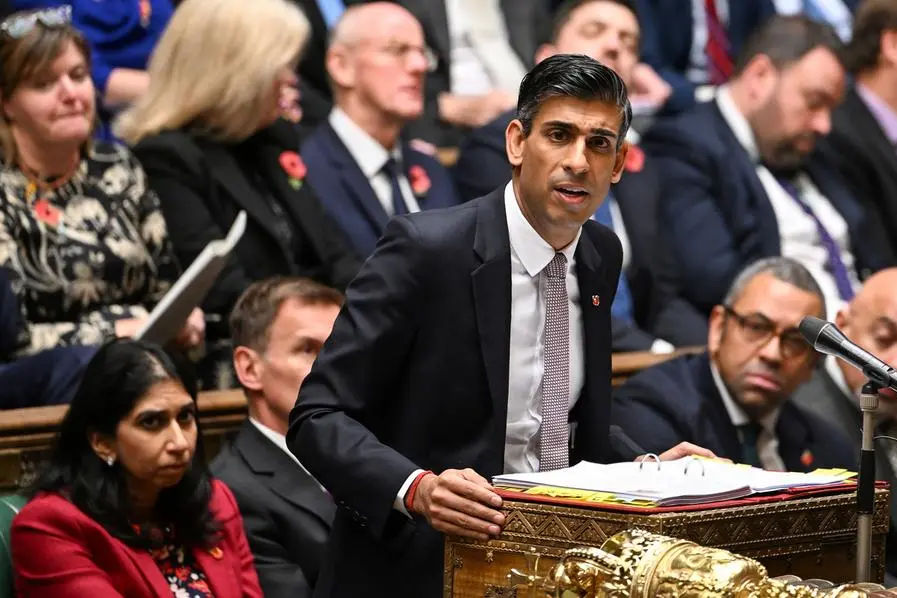PHOTO
New York, United States: A British austerity budget hit the pound and gilts on Thursday, while stocks suffered worldwide on the glum economic outlook and prospect of painfully high interest rates to curb inflation.
Britain's tough budget involves £55 billion ($65 billion) of tax hikes and spending cuts, moves that finance minister Jeremy Hunt said were needed to bring financial stability after recent market turmoil.
While he said the measures would alleviate rather than aggravate the downturn, that failed to reassure markets, with the pound falling and government borrowing costs rising.
Traders fear the budget will worsen Britain's cost-of-living crisis after inflation spiked to a four-decade high of 11.1 percent, and the government confirmed the economy was already in a recession that could last two years.
"Today's budget should have walked the line between pushing inflation lower, without completely crushing demand in the economy with too many tax rises, and spending cuts," CMC Markets analyst Michael Hewson said in a note to investors.
With an earlier markets upheaval over the profligate fiscal policies of the previous government having largely subsided, he said a budget that makes it harder to do business in the country was no longer necessary.
Wall Street stocks closed mostly lower as well for a second day, with investors worried that the US Federal Reserve will continue to aggressively raise interest rates to combat red-hot inflation, even if it means tipping the economy into a recession.
While markets have been reassured by data suggesting that price pressures are diminishing, recent statements by central bankers spooked traders.
"Concerns that the Fed will overtighten and force the US economy into a hard landing were partly behind yesterday's selling," said Patrick O'Hare at Briefing.com.
"Those concerns remain in place today and have been heightened by remarks made this morning" by more Fed officials, he added.
St Louis Fed President James Bullard said the benchmark lending rate is not yet "sufficiently restrictive," and echoed other officials who said more rate hikes will be needed.
But Kansas City Fed President Esther George cautioned on Wednesday that it is unclear how policymakers can tamp down inflation "without having some real slowing" or even a contraction in the economy.
Oil prices plunged on worries about weakening demand.
"China remains a downside risk for oil in the near term, despite its recent relaxation of certain Covid curbs," said Craig Erlam at OANDA online trading platform.
"A surge in cases in major cities, mass testing, and restrictions will hit economic activity," he added.
- Key figures around 2145 GMT -
New York - Dow: FLAT at 33,546.32 points (close)
New York - S&P 500: DOWN 0.3 percent at 3,946.56 (close)
New York - Nasdaq: DOWN 0.4 percent at 11,144.96 (close)
EURO STOXX 50: DOWN 0.1 percent at 3,878.42 (close)
London - FTSE 100: DOWN 0.1 percent at 7,346.54 (close)
Paris - CAC 40: DOWN 0.5 percent at 6,576.12 (close)
Frankfurt - DAX: UP 0.2 percent at 14,266.38 (close)
Tokyo - Nikkei 225: DOWN 0.4 percent at 27,930.57 (close)
Hong Kong - Hang Seng Index: DOWN 1.2 percent at 18,045.66 (close)
Shanghai - Composite: DOWN 0.2 percent at 3,115.43 (close)
Pound/dollar: DOWN at $1.1867 from $1.1914 on Wednesday
Euro/dollar: DOWN at $1.0370 from $1.0395
Dollar/yen: UP at 140.20 yen from 139.54 yen
Euro/pound: UP at 87.34 from 87.21 pence
Brent North Sea crude: DOWN 3.3 percent at $89.78 per barrel
West Texas Intermediate: DOWN 4.6 percent at $81.64 per barrel
© Agence France-Presse





















